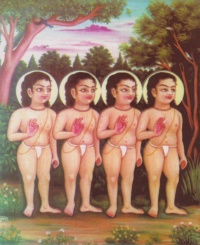Kumaras
Kumara
Kumara (devanāgarī: कुमार kumāra) es un término Sánscrito que se refiere a un niño o niña virgen, o célibe joven.En la mitología Hinduista se refiere a los primeros seres creados por Brahmā al comienzo del proceso de creación por su propia mente. Los cuatro Kumāras son así descritos como los primeros hijos nacidos de la mente. Aunque se esperaba de que ellos ayudaran al proceso de creación, y en cambio que se niegan a procrear y en su lugar se dedican al celibato y a la adoración de Dios. Se dice que vagan por el universo sin ningún deseo, pero con el propósito de enseñar.
they refuse to procreate and instead devote themselves to celibacy and worshipping God. They are said to wander throughout the universe without any desire but with purpose to teach.
In the Theosophical view, the Kumāra is a hierarchy of celestial beings which, as any other hierarchy, involves entities of different degrees of evolution, from Dhyan-Chohans to the reincarnating Egos of human beings.
General description
H. P. Blavatsky wrote in her The Theosophical Glossary:
The first Kumâras are the seven sons of Brahmâ, born out of the limbs of the god, in the so-called ninth creation. It is stated that the name was given to them owing to their formal refusal to “procreate their species”, and so they “remained Yogis”, as the legend says.[1]</blockquot
- ↑ Helena Petrovna Blavatsky, The Theosophical Glossary (Krotona, CA: Theosophical Publishing House, 1973), 182.
